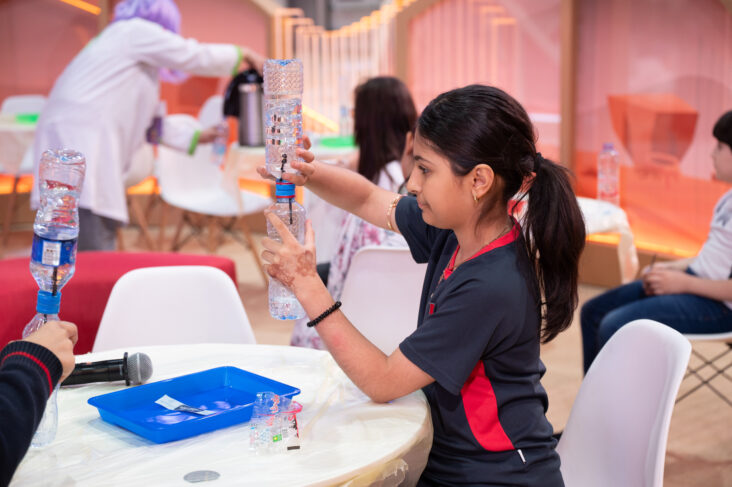SCRF 2025: Children Learn To Tell Time With 9th-Century Water Clocks

Primary school children donning smartwatches and digital watches travelled back in time to discover how their ancestors told time using water at a science workshop called “The Water Clock” at the Sharjah Children’s Reading Festival (SCRF 2025), which got under way at Expo Center Sharjah on Wednesday.
Part of a series called “Time Discovery”, the workshop introduced them to Abbas ibn Firnas, a 9th century Muslim scientist from Andalusia, Spain known for his interest in astronomy and time measurement.
The trainers from Sharjah-based Aufuq al Ebda’ provided each child with two empty 500 ml bottles, the caps of which were stuck together with glue. The caps had two holes through which they passed two black pipes, as long as 5 centimetres. The children were given water to pour into one of the bottles, and the caps were firmly closed with the hollow pipes in place. The second bottle was then matched with its cap and closed tight. The children then set them down on the table with the full water bottle on top and the empty one below. The trainer demonstrated how the water dripped through the pipes to the empty bottle below in ten minutes, employing the same technique as in a sand glass.
“Before the advent of modern clocks that we use today, people used tools like water clocks. A water clock works by letting water flow from one container to another. When the water reaches a certain level, it signals that a specific amount of time has passed,” explained the trainer Shalam. The workshop not only introduces children to their rich Islamic heritage, but shows them how to make best use of recycled materials, she added.
Taking place from April 23 to May 4 at Expo Centre Sharjah, the 16th edition of SCRF promises an immersive experience under the theme “Dive into Books”. Organised by the Sharjah Book Authority (SBA), this year’s agenda will be led by a global cast of 133 guests from 70 countries, and 122 Arab and international publishing houses from 22 nations.
With a programme that blends science, art, technology, and literature, the festival transforms reading into a multi-sensory adventure – welcoming children, teenagers, and adults to explore more than 600 hands-on workshops, interactive sessions, and live performances designed to inspire every kind of young mind.

